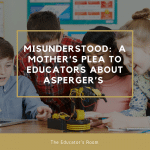Respect. Responsibility. Perseverance. As teachers we are supposed to not only be good role models for value and character, but we are also supposed to help our students grow in these areas as well. Time and again we hear how society has developed a ‘lack of character’ over the course of several generations. I’ve read numerous articles lately about children being disrespectful to adults with without a correction or children using inappropriate language or obscene gestures while in the company of adults who either laugh about it or just try to ignore the behavior. We’ve all seen it.
But what about those children who come to us each year who have very little or no foundation that we as teachers can even build upon? You know the ones I’m talking about: chronically late, no homework, lacking cleanliness, disrespectful. When these children show up in our third grade or younger classrooms, whom do we hold responsible?
I wish every parent had some type of innate ability to assume life principles, as soon as that baby is handed to them. But as we all know that doesn’t happen. Just look no further than the local grocery store checkout line and you’ll recognize it even if you aren’t a teacher. But what do we do? Is it on our shoulders to try to correct what might very well be several generations’ lack of teachings?
With a sigh, I feel we must answer ‘yes’ to this.
Where do we begin? It’s not our job to tell our parents how to ‘parent’ their child. It is our job to teach, and a lot of the time we are teaching the parents as well as the children. Maybe as teachers we need to back up a few steps and remember our responsibility as educators is to open up windows of opportunity for everyone we come into contact with, including parents and caregivers. In order to do this, we must change our ways of thinking, our ways of communicating and our ways of approaching the lack of character we see in so many of our families.
In order to do this though, we must first establish good relationships with our parents. Easy right? Because the parents who need it most are ALWAYS the ones who show up at conferences or initiate emails or drop their children off at school. They are very easily accessible.
Not so much.
But here is where our teachable moments come into play. We need to remember that it is our job to meet them halfway- or three- quarters of the way, or even seventh-eighths of the way. We hold valuable tools in our teacher’s tool belt to teach parents how to instill those life principles in their children we so desperately want demonstrated in our classrooms. Those tools are the life principles themselves. We use them all the time with our students. Why not use them with our parents too?
There are so many times when eight-year-old little Johnny walks into my classroom, hair unbrushed, eyes rolling at my morning greeting with a shrug when I remind him to turn in his homework. I can show him all the responsibility, respect, perseverance, good citizenship, etc, but I can guarantee that the seven hours I have him doesn’t hold a candle to the other seventeen hours he is somewhere else with someone else who lacks the skills that I have (or who may not have the support network that I have).
We meet our children where they are. If Sally comes in with tears in her eyes we automatically scoop them up emotionally and try to figure out what has happened to cause her to be so distraught before the day has even begun.
Why not do that with our parents?
We all know parenting is a difficult undertaking and we can become callous and say, “They knew what they were getting into!” But did they really? I don’t ever remember coming across anything that would truly prepare me for parenthood. Just like all those college hours never truly gave me what I needed for managing a classroom full of live wires who come from all walks of life. Both are ‘on the job’ JOBS with no flow chart or simulator training before being thrown into the den of lions.
So what do we as teachers do? Do we look at the parents as lost causes and just try our hardest to make it through the year, tolerating our little Johnnys and telling ourselves that he’s the one starfish that we can’t make a difference in? Do we constantly ride little Johnny, creating an outlet for all our stress, but causing him to be even more disrespectful and irresponsible as the year goes on because he assumes that we are one more adult who doesn’t really care?
The truth is that we are INVESTING in these kids. We can fill them up or drain them. We can give them the attention that so many of them need in either a positive manner or a negative one. They watch us. They imitate us. They LISTEN to us. What are we telling them?
I believe that the change we so want to see in our children begins in our classrooms and flows backward, against the current, into the homes of these children. What we say to them, how we handle situations, what expectations we hold them accountable to, all of it eventually grabs hold of their lives and becomes the habits we want demonstrated in our classrooms. And once habits are established in the classroom, they carry back into the homes that need the stability of those habits.
Exhausting? Yes.
Emotionally draining? Most definitely.
Life changing? More than you can ever dream imaginable.
And not only for the families, but for us as well.




